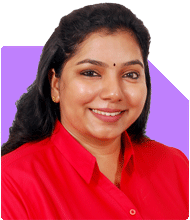Ramalingam Kalirajan |7438 Answers |Ask -Follow
Mutual Funds, Financial Planning Expert - Answered on Apr 23, 2024
He has an MBA in finance from the University of Madras and is a certified financial planner.
He is the director and chief financial planner at Holistic Investment, a Chennai-based firm that offers financial planning and wealth management advice.... more

Hi, i am 40 years old i want to invest 5k in mutual funds ,what is the best option to play safely?
Balanced Funds: These funds invest in both equities and debt, providing a balanced approach to growth and stability. They aim to offer decent returns with lower volatility compared to pure equity funds.
Large Cap Funds: These funds invest in large, well-established companies that are generally less volatile than smaller companies. They tend to perform well over the long term and are considered safer compared to mid and small-cap funds.
Debt Funds: If you're looking for stability and regular income, debt funds can be a good option. They invest in fixed-income securities like government bonds, corporate bonds, and money market instruments. They offer relatively stable returns but generally lower than equity funds.
Index Funds: These funds aim to replicate the performance of a specific market index (like Nifty or Sensex). They come with lower expense ratios and offer a diversified exposure to the market.
Systematic Investment Plan (SIP): Instead of a lump sum investment, consider investing through SIPs. It allows you to invest a fixed amount regularly, helping in rupee cost averaging and reducing the impact of market volatility.
Remember, while these options are considered safer, all investments carry some level of risk. It's essential to align your investment choice with your financial goals, risk tolerance, and investment horizon. Consulting a financial advisor can help you make an informed decision tailored to your needs.
You may like to see similar questions and answers below
Jinal Mehta |95 Answers |Ask -Follow
Financial Planner - Answered on Feb 01, 2024
Ramalingam Kalirajan |7438 Answers |Ask -Follow
Mutual Funds, Financial Planning Expert - Answered on May 18, 2024
Ramalingam Kalirajan |7438 Answers |Ask -Follow
Mutual Funds, Financial Planning Expert - Answered on Jul 27, 2024
Kanchan Rai |469 Answers |Ask -Follow
Relationships Expert, Mind Coach - Answered on Jan 05, 2025
Kanchan Rai |469 Answers |Ask -Follow
Relationships Expert, Mind Coach - Answered on Jan 05, 2025
Milind Vadjikar |833 Answers |Ask -Follow
Insurance, Stocks, MF, PF Expert - Answered on Jan 05, 2025
Kanchan Rai |469 Answers |Ask -Follow
Relationships Expert, Mind Coach - Answered on Jan 05, 2025
Milind Vadjikar |833 Answers |Ask -Follow
Insurance, Stocks, MF, PF Expert - Answered on Jan 05, 2025
Ramalingam Kalirajan |7438 Answers |Ask -Follow
Mutual Funds, Financial Planning Expert - Answered on Jan 05, 2025
Ramalingam Kalirajan |7438 Answers |Ask -Follow
Mutual Funds, Financial Planning Expert - Answered on Jan 05, 2025
Milind Vadjikar |833 Answers |Ask -Follow
Insurance, Stocks, MF, PF Expert - Answered on Jan 05, 2025
Pushpa R |39 Answers |Ask -Follow
Yoga, Mindfulness Expert - Answered on Jan 05, 2025
Radheshyam Zanwar |1122 Answers |Ask -Follow
MHT-CET, IIT-JEE, NEET-UG Expert - Answered on Jan 05, 2025

























